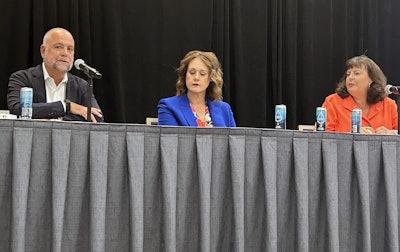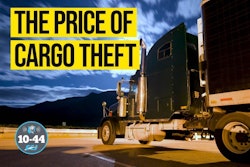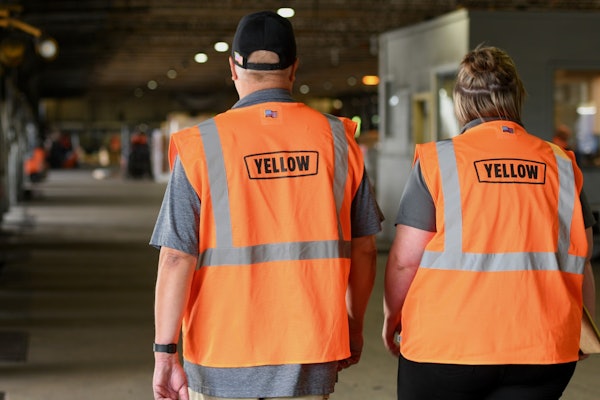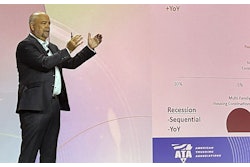
Making sense of economic data, securing cargo, and supply chain data have never been more critical than they are during these challenging economic times and swirling regulatory uncertainty.
At the American Trucking Associations' 2025 Management Conference & Exhibition in San Diego Saturday, J.B. Hunt Transport (CCJ Top 250, No. 5) Director of Intermodal Pricing Amy Horn said the current down cycle has lasted longer than anyone ever imagined but added that shippers are concerned about when and how a market correction will arrive.
"We have been in a shipper's market," she said. "They know the change is coming, they just don't know when."
Some shipper customers have shifted bid cycles to lock in more favorable rates should the market see a near-term bounce, Horn said. She warned carriers that as shippers continue attempts to reduce their budget, fleets have to push back and get shippers to cut costs elsewhere.
The economic cash crush isn't exclusive to motor carriers. Horn noted an uptick in customers asking for extended payment terms.
"If the government is your shipper right now, that is a huge problem," Cheryl Garcia, U.S. Bank senior vice president of government transportation, said of the lingering government shutdown that has shuttered many departments.
Garcia added it's important for fleet leadership to measure their individual operations against industry trends to evaluate the health of their business. However, the shutdown, too, has impacted data collection as many of those offices are currently closed.
Noting he's "seeing some hints that the market is changing," Bob Costello, American Trucking Associations chief economist, added that slow- and no-pay customers have stressed trucking companies' cash flow, leading some to cut corners.
"There are a lot of small fleets that have cut to the bone," he said. "As a result, things like deferred maintenance... it's going to catch up to you at some point... and they're not going to survive as a result."
Garcia agreed that there are no savings to be had when it comes to postponing maintenance.
"It's pay me now or pay me later," Garcia said. "If you put off maintenance costs, it's going to cost you even more in the future... whether that's breakdowns or injuries and accidents."
The cost of injuries and accidents is an ongoing concern for fleets. Insurance costs, Horn said, have been one of her carrier's biggest cost increases in the last three years across the board, and she doesn't foresee that slowing down any time soon.
"It's not just cargo insurance costs that are rising," she added. "It's medical costs. It's insurance in every vein that's impacting us."
Insurance costs are also driven by incidents of theft, a criminal enterprise that costs the industry upwards of $18 million every day.
Cargo theft, Costello said, is one of the few bipartisan issues in D.C. right now.
"Everybody is a victim in this space," he said. "You're either spending more money to not be a victim, which means you're a victim, or you're a victim of cargo theft."
Horn suggested carriers look at how they're securing cargo, starting with one of the first things a would-be thief might encounter on a trailer: the seal.
"They're plastic seals that in half a second can be cut off," she said, suggesting the use of heavier, more reliable seals and tracking devices, despite the added costs.
Yet not all theft cases are someone taking something off a trailer. They in many cases are sophisticated technology-enabled attacks where entire loads are rerouted and the proceeds used to fund entire organizations.
Criminal rings, Garcia said, are "really good," adding "a lot of this is irregular warfare where they are state-sponsored and organized criminals using data."
Garcia and Horn both agreed one of the best and simplest things carriers can do to fight through tough times is share data.
"While we're all each other's competition, there are ways we can work together," Horn said, adding J.B. Hunt has worked with other carriers and law enforcement agencies in cases of bad debt and theft.









![Volvo Vnl Sleeper Review[20]](https://img.ccjdigital.com/mindful/rr/workspaces/default/uploads/2025/11/volvo-vnl-sleeper-review20.lrVppY9UDR.jpg?auto=format%2Ccompress&fit=crop&h=167&q=70&w=250)



